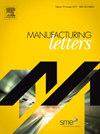Enhancing surface treatment performance of water cavitation jet peening by dissolving CO2
IF 1.9
Q3 ENGINEERING, MANUFACTURING
引用次数: 0
Abstract
Inducing compressive residual stress into surface layer is believed to enhance fatigue strength of materials. Water cavitation jet peening (WCJP) is recommended because of its high efficiency and uniform processing. This work proposes an enhanced WCJP technology by dissolving carbon dioxide (CO2). Mass loss, Vickers hardness, surface profile, residual stress, cavitation pit and grain size of the processed Aluminum were investigated. Results indicate that appropriate CO2 dissolution promotes cavitation peening with less surface distortion. The induced compressive residual stress is 28.6 % larger than pure waterjet peening. CO2 content of 200 mg/L is recommended to obtain a desired peening performance.
通过溶解CO2提高水空化喷丸表面处理性能
在表层引入残余压应力可以提高材料的疲劳强度。水空化喷射强化(WCJP)因其效率高、加工均匀而被推荐使用。本工作提出了一种通过溶解二氧化碳(CO2)来增强WCJP技术。研究了铝合金的质量损失、维氏硬度、表面形貌、残余应力、空化坑和晶粒尺寸。结果表明,适当的CO2溶解有利于空化强化,且表面变形较小。产生的残余压应力比纯水喷丸大28.6%。建议CO2含量为200 mg/L以获得理想的强化性能。
本文章由计算机程序翻译,如有差异,请以英文原文为准。
求助全文
约1分钟内获得全文
求助全文
来源期刊

Manufacturing Letters
Engineering-Industrial and Manufacturing Engineering
CiteScore
4.20
自引率
5.10%
发文量
192
审稿时长
60 days
 求助内容:
求助内容: 应助结果提醒方式:
应助结果提醒方式:


